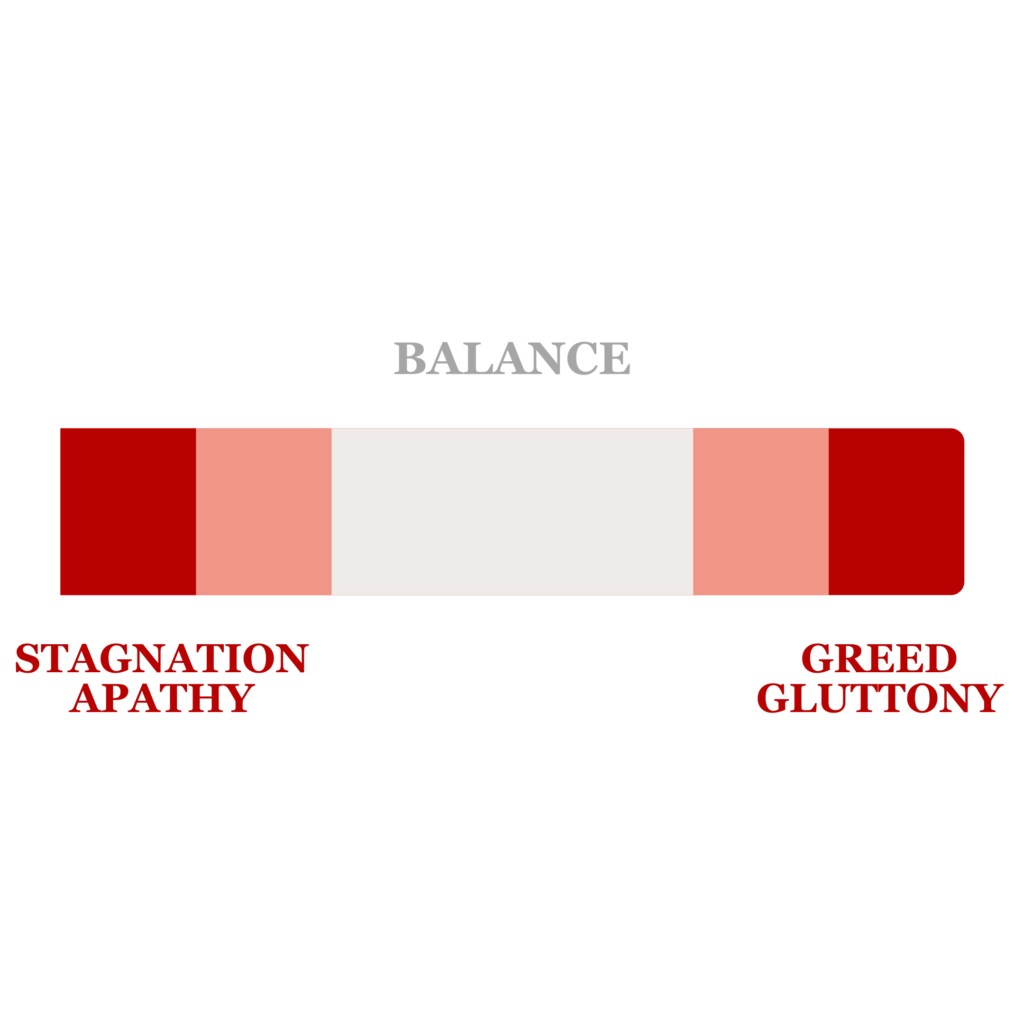There’s a common misperception that wanting more is bad. We are told to be happy with what we have and to realize all the blessings in our lives. While it’s good to practice gratitude, simply being content is not the answer. If we don’t want more, we lack ambition and stagnate. Stagnation, whether personal, professional, or other forms, is bad too. Like most things in life, we have to balance the dichotomy of wanting more and being thankful for what we have.
There are Many Reasons to Avoid Wanting More
The Criminal
The Psychology of Money, by Morgan Housel is a phenomenal book. It covers many topics in finance and shares life lessons to foster better thinking and habits. There’s one concept in particular that stuck out, though: getting the goalpost to stop moving.
Housel uses the image of a moving goalpost to illustrate our unquenchable thirst for more. It’s a terrible, addictive tendency that leads to perverse behavior. And it causes otherwise smart, thoughtful people to do regrettable things.
In The Psychology of Money, Housel tells stories about such examples. One is Rajat Gupta, a person who grew up in the slums of India yet went on to become the CEO of McKinsey, a director for numerous Fortune 500 firms, and a centa-millionaire. But he wanted more. He wanted to be a billionaire. So he cut corners and traded financial securities with his inside information. He made millions more from it, but (of course) was caught. It was a simple case. Gupta was fined and stripped of his roles. His reputation was tarnished. Having influence and hundreds of millions of dollars wasn’t enough. He wanted more and paid the price.
Housel also tells the story of Bernie Madoff. Most people know of the notorious Ponzi scheme he conceived. But they often don’t know that before that crime, he was a legitimately successful and wealthy businessman. He owned and operated Bernard L. Madoff Investment Securities, a market-making firm that cleanly raked in $25-$50 million a year. Yet it wasn’t enough for Madoff, and he too pushed far past the limit. All in the pursuit of more.
The Amoral
Always wanting more leads to gluttony. This is relevant in all aspects of life: too much food, drink, chemicals, cars, houses, electronics, and so on. It’s over-indulgence.
Over-indulgence is a self-inflicted misery. It’s a short-term high that’s sought for instant gratification, ignoring the long-term consequences. And like a drug, its efficacy wanes after use so we then need greater potencies. That’s the danger and it’s why we have to guard against it. Indulgence can quickly become an addiction.
The dangers of gluttony have long been known and warned against. For instance, ancient civilizations named gods to identify, and then avoid, the temptation of gluttony. Modern-day religions around the world have used their might to advocate for discipline to combat the pull of over-indulgence. Even some tribes in remote parts of the world will exile members for gluttonous behavior. The ubiquitous nature of guarding against gluttony should serve as a warning for us: it’s dangerous to over-indulge in anything so we’d do well to avoid doing so.
The Unhealthy
Health—especially mental health—is in jeopardy when we always want more. Endlessly wanting more, regardless of how much we have or how much we achieve, leads to feelings of inadequacy. In this case, it doesn’t matter what we do because we’ll never have enough. Part of the problem is that no matter how much we have or how much we achieve, there will always be someone who has more or who has done more.
Housel covers this phenomenon in The Psychology of Money too. He says:
Consider a rookie baseball player who earns $500,000 a year. He is, by any definition, rich. But say he plays on the same team as Mike Trout, who has a 12-year, $430 million contract. By comparison, the rookie is broke. But then think about Mike Trout. Thirty-six million dollars per year is an insane amount of money. But to make it on the list of the top-ten hedge fund managers in 2018 you needed to earn at least $340 million in one year. That’s who people like Trout might compare their incomes to. And the hedge fund manager who makes $340 million per year compares himself to the top five hedge fund managers, who earned at least $770 million in 2018. Those top managers can look ahead to people like Warren Buffett, whose personal fortune increased by $3.5 billion in 2018. And someone like Buffett could look ahead to Jeff Bezos, whose net worth increased by $24 billion in 2018—a sum that equates to more per hour than the “rich” baseball player made in a full year.
Nick Maggiulli writes similarly in his blog post about feeling rich.
We compare up. Rarely do we compare ourselves to those less fortunate. While comparing ourselves up to others has benefits like growing our own ambition and inspiration, it’s easy to feel inadequate instead. Or envious.
We’d do well to remember that comparisons are tricky endeavors rife with potential pitfalls. Like we wrote in “How to Effectively Use Role Models”, we have to take into consideration the whole of the other person with whom we are comparing ourselves. What did they sacrifice along the way to get to where they are? What are they missing out on that we have? Chances are it’s something that really matters, like reputation, friends, family, and joy. Are we willing to give that up to be like them?
And just because we can always point to someone who has more or who has done more, remember that others can point to us too.
Don’t Overcorrect
As we can see, the insatiable desire for more is a precursor for undesirable outcomes. So should we not want to have more? Should we not want to achieve more? Should we just be content?
The quick answer is no. Viewing life as either being content with what we have or wanting more is overly simplistic. It’s a black and white characterization of a life that is gray. When we accept the chromatic spread, we set ourselves up to achieve more. We’re able to see the world as it actually is. We don’t shut out possibilities.
Reasons for Avoiding Contentedness
Now that we’ve covered the negative consequences of always wanting more, suppose we do overcorrect. Instead of always wanting more, we move to the other end of the spectrum where we refrain from all desire.
While practicing gratitude for what we have is a useful endeavor, getting lost in the land of contentedness leads to stagnation. If we don’t want more, we won’t strive to achieve anything further. We will individually stop growing. Which means we as a civilization will stop growing. We will stop creating. We will stop improving.
Imagine how different life today would be if our ancestors were just content with how everything was. All the things we take for granted—electricity, flight, indoor plumbing, computing, life-saving medicines—are absent. They wouldn’t exist if we as a species didn’t want more. The desire for more is the motivation to make effortful—sometimes painful—strides to create, grow, and improve.
Despite the advancements we’ve made over the years, things aren’t perfect here in the present. So we musn’t rest on our laurels. Imagine what the future would look like if we stopped now.
Moreover, stagnation isn’t good for us either. As Brene Brown says, we are wired for struggle. It’s difficult and uncomfortable, but as long as we choose to make meaning out of the struggle, we benefit. Struggle makes us who are are capable of becoming. We grow to overcome the demands in front of us. When we don’t have anything to overcome, nothing to aspire to become, we stagnate and eventually wither.
Our withering affects us both mentally and physically. When we don’t have aspirations, we become apathetic. We detach from the world around us. We distance ourselves from others. Not caring about our direction in life is bad enough. But neglecting our relationships is another layer of negativity that infiltrates our lives, making it harder to turn the ship around.
The Right Balance of Wanting More
There are levels of desire, each laced with nuance, and some better options than others. This makes discernment much more difficult, but much more rewarding.
Here’s the thing: the goalpost is moving. And we need it to keep moving. But we also usually need the goalpost to slow down.
The trick with a moving goalpost is regulating its speed. Its movement isn’t constant, nor should it be. But there is a useful velocity range—a balance—that we should strive to keep within.

We need the goalpost to keep moving but at our own, imperfect rate so we’re able to grow in a healthy way. This doesn’t mean removing all hardship. As we previously mentioned, we require struggle to grow. But it’s all about finding the right amount of struggle. Again, balance.
To add another layer to it, maybe different interests require different paces. That is to say, maybe the goalpost velocity for personal finance should be different than the goalpost velocity of fitness goals. The consequences of overshooting (or undershooting) each goalpost are different and therefore we should identify the goalposts that have the greatest impact on us if we get it wrong. Then take heed when pursuing those goalposts.
Conclusion
We don’t want the goalposts to stop moving. If they did, we would lack ambition. We would stop growing. But for so many of us, the opposite is the problem: the goalposts are moving too fast. When this happens, we cannot get ahead. In fact, it’s a struggle just to keep up with what we think our baseline should be. It’s a tricky endeavor that is detrimental if we get it wrong in either direction.
But here’s the catch. The goalposts don’t matter.
In the end, it’s not about the goalposts. It’s not about actually getting to them because we can’t. And even if we could, the point of living isn’t about the destination. It’s about moving forward. It’s about the grind. It’s about the process. It’s about growing. And evolving. It’s about compounding our efforts, our capital, our knowledge to become so much more.
And we don’t do this alone. The journey of following the moving goalpost is best with other people and is often where we forge some of the best relationships.
Goalposts change over time. We aren’t the same people we were ten years ago. Our aspirations have changed. If they’ve changed before, it’s likely they’ll change again. Therefore, it doesn’t make sense to fixate on reaching a specific goalpost. A more useful endeavor is to focus on the things that actually matter, like relationships, personal growth, and creating value for others.
The first step to that point is finding the right balance.

